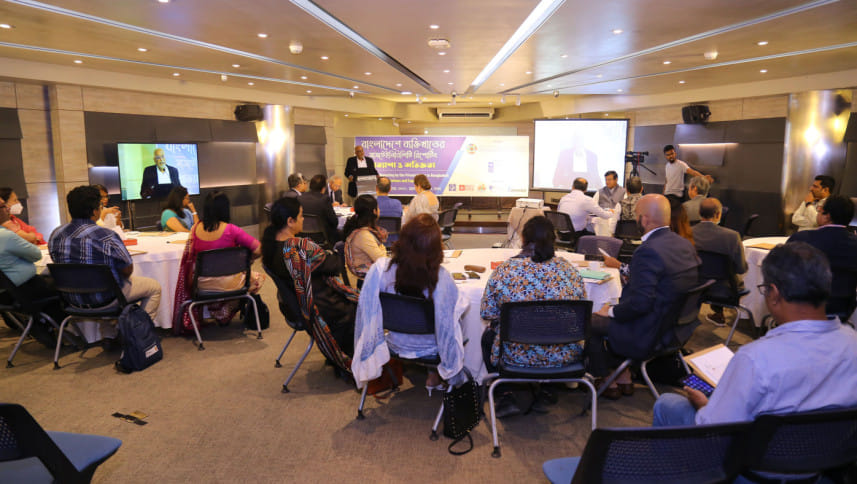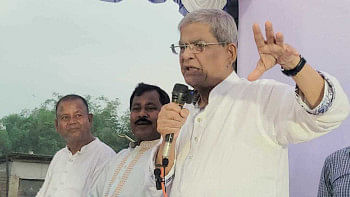Awareness on sustainability reporting needed

Only 58 companies in Bangladesh file sustainability reports and therefore mass awareness needs to be generated so that corporates are prompt to disclose the reports voluntarily, said analysts and entrepreneurs yesterday.
Sustainability reports are a global practice of companies disclosing non-financial performance information, such as that concerning environmental, social, economic and governance issues.
Awareness among customers also needs to be increased so that they check the status of producers' sustainability issues before using their products. Only then will entrepreneurs will gain an interest in adopting the practice, they said.
Bangladesh needs an institutional framework to promote and guide this practice for the sake of stronger and sustainable private sector growth, they added.
The analysts said there was no tax rebate on importing environment friendly raw materials and advanced technology and the National Board of Revenue should work on it.
The recommendations came at a national policy dialogue on "Sustainability Reporting by the Private Sector in Bangladesh: Expectations and Experience" at Brac Centre Inn.
It was organised by the Citizen's Platform for SDGs, Bangladesh in partnership with United Nations Development Programme–United Nations Environment Programme (UNDP–UNEP) Poverty-Environment Action for Sustainable Development Goals.
Businesses all over the world target to reduce cost and increase revenue and profits, said Saber Hossain Chowdhury, chairman of the Standing Committee on the Ministry of Environment, Forest and Climate Change.
So, when they see that sustainability reporting impacts their business positively, they will be interested, he said.
Now Bangladesh remains a linear economy, meaning producing a product and turning it into waste after consumption, he said, adding that the country needs to follow a circular economy so that the best uses of resources were ensured.
Everyone should adopt and promote sustainability not only as a process but also as a culture, Chowdhury added.
Sustainability reporting should be integrated and in a holistic approach as there is no unique regulator to oversee the reports, said Debapriya Bhattacharya, convenor of the citizen's platform.
"Gradually, a sustainability reporting act should be launched," he said.
In the supply chain, there is a power asymmetry, so international clothing retailers and brands dominate the mechanism for setting prices. For this, producers who adhere to environment, social and governance issues are not getting premium prices, he said.
In the present economic situation amidst a dearth of power and energy, sustainability reporting might be a powerful way of reducing energy consumption, recommended Bhattacharya, also a distinguished fellow of the Centre for Policy Dialogue (CPD).
Sustainability reporting is significant in the process of making the status graduation from a least developed country and attaining Sustainable Development Goals (SDGs), he added.
"Whatever be the costs for environment friendly production, we do not get a higher price for it," said Md Fazlul Hoque, managing director of Plummy Fashions.
"We even cannot express it on the tags of our products," he said.
Moreover, availing government incentives on going green issues are a massive hurdle. In spite of this, some entrepreneurs still go green, said Hoque, also a former president of Bangladesh Knitwear Manufacturers and Exporters Association.
Zaved Akhtar, CEO of Unilever Bangladesh, said brands rooted with sustainability grow faster.
However, local customers are still not aware about environmental, social, and corporate governance (ESG) and are sensitive to prices, he said.
The ESG is an umbrella term that refers to specific data designed to be used by investors for evaluating the material risk that an organisation is taking on based on the externalities it is generating.
As a global standard Unilever Bangladesh is strictly following environmental issues, he added.
Most Bangladeshi companies do not have the required human resource, expertise or experience to prepare sustainability reports, said Asif Ibrahim, chairman of Chittagong Stock Exchange.
He regretted that comprehensive research on such standards was also absent at the company level. Technical assistance and potential knowledge sharing are both crucial components for developing reporting skills, he said.
Towfiqul Islam Khan, a senior research fellow of the CPD, delivered the keynote presentation.
Prof Mustafizur Rahman, a distinguished fellow of the CPD, Kamran T Rahman, senior vice president of the Metropolitan Chamber of Commerce and Industry, Prasenjit Chakma, assistant resident representative of the UNDP, Amitabh Chakraborty, additional director of Sustainable Finance Department of Bangladesh Bank, Shams Mahmud, a former president of the Dhaka Chamber of Commerce and Industry, and Ferdaus Ara Begum, chief executive officer of Business Initiative Leading Development, also spoke at the event.

 For all latest news, follow The Daily Star's Google News channel.
For all latest news, follow The Daily Star's Google News channel. 



Comments